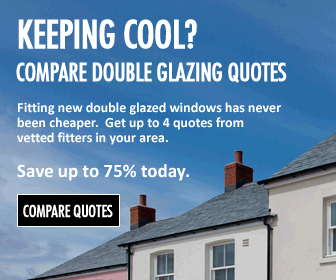Dealing with a sales visit

Some hints and tips how to ensure you stay in control when the salesperson calls round
Double glazing salespeople. The words alone are enough to induce panic attacks, but it needn't be that way.
Due to the nature of their industry, double glazing and conservatory salespeople often work on a commission-basis, meaning that they only get paid for what they sell. Unfortunately this often means sales tactics that many would call "the hard sell".
You've now chosen your preferred fitter, and are ready to start talking money. In order to get an estimate you'll need to invite someone into your house to provide a quote, based on what work you need doing.
Follow these tips to ensure that you ensure the process runs smoothly, without the usual pressure involved in a salesperson visit, and of course to get the best deal put on the table.
Understand the nature of the sales process
The vast majority of salespeople who work in the double glazing and conservatory business work on commission - often commission only. This means that consumers may be exposed to some pushy (sometimes unscrupulous) sales techniques designed to influence you into signing the contract.
As with many industries with high-value, high-commission products (such as cars, homes etc.) the work attracts those that are comfortable using a high-pressure sales tactics that attempt to squeeze as much money from your bank account as possible.
Understand that this takes place, learn some of the techniques that you may be exposed to (see our section below), and you'll gain the upper hand when you deal with salespeople. It'll help when you deal with these people for other services, too.
Don't be alone on the sales visit
If you've invited a company representative to visit your home to give you a quote, then ensure that another adult is present when they visit. Salespeople are less inclined to launch into hard sales tactics when there is another person present.
Don't sign anything on that first visit, and ensure that they are made aware that you have a limited amount of time available. Some salespeople will make it hard for you to show them the door.
Be Aware of Sneaky Sales Techniques
There are many, many techniques that are used every day by salespeople attempting to sell their conservatories and double glazing. Some of them are acceptable methods, others are downright disgraceful.
Bear in mind that every industry - especially those with high value, high-commission products such as vehicles, property, home improvements and so on, are subject to these tactics. They're certainly not unique to the double glazing industry. It's just the terminology that changes, not the methods.
However, it remains a fact that pushy sales tactics are one of the biggest causes for complaints in the industry. Good firms will not use pushy techniques, but will listen to the customer, give them time to convey their thoughts, be patient and understand their needs.
For the sake of clarity, we'll be using "he" when referring to the salesperson in the techniques below, but it could equally refer to "she".
1. Upselling - if the salesperson feels like he's on to a catch, they may even talk down the quality of their basic package(s), claiming that they may be inferior, in order to upsell their high-value, top-end range which makes them more commission. Be aware that all products should meet the minimum quality standards. If a salesperson tells you their basic products are rubbish, say thank you and show him the door.
2. Fear of Loss - Tapping into a basic human instinct here, the salesperson will claim that unless you sign the contract there and then, the offer will not be available afterwards.
Most salespeople work on commission basis - and are given a higher commission if they close the sale on their first visit, which means that they are likely to use this technique.
Everyone wants a bargain, and everyone wants it now. Losing out on a great deal because you were too late or didn't act in time is gutting, and the salesperson will often use this basic instinct to get you to act quickly. Take your time, don't commit to anything you're not sure of. 99 times in 100 they will give you that offer even after the deadline.
3. Fake Discounts - Salespeople who operate on large commissions can often offer seemingly large discounts to tempt you into signing on the dotted line. Be very careful about discounts, as they often do not exist. Some techniques include:
- Placing a advertising board on your front garden. Usually a technique to tempt you to fall for a discount.
· Being a show home. Sounds like you'll be getting a great deal but again, usually designed to get you to commit to a discount. There are no show homes, it's a well-trodden technique to influence you into signing the contract.
· "I'll phone the manager to see if I can give you a better deal". The salesperson already knows what their lowest price is. Phoning the manager adds both a sense of urgency and an element of making you feel 'special'.
· Get the back done free. Very few things in life are truly free. If you think they're giving you free windows then you are sorely mistaken. No company can afford to give their products away free of charge.
If you find yourself being offered a huge discount (say 40% or more), then be very cautious about proceeding.
4. Misleading Claims - Dodgy salespeople may use misleading claims, including saying they're a member of an accredited organisation, or that they're tested by government auditors, or "chosen for its scrappage scheme". If a salesperson makes these types of claims, ask them to back it up with proof.
5. Credit Deals - If you are offered a lower price in return for a 'credit-deal', then ensure you examine the deal very carefully, as you could end up paying much, much more in the long run.
6. Government Funding for Discounts - There is no such funding in operation. Show them the door.
7. Showing the customer the list price - The company's list price is the best price they feel they can achieve for their products. Rarely will a salesperson get the full list price (think of it in the same way as a hotel room tariff - they rarely achieve it), but on occasion just giving the potential customer the list price and saying nothing will result in the sale. Always hold out for the best price - and show any competing quotes from other suppliers.
Don't expect something for nothing. There is no such thing, in any industry. There's always a catch.
VAT registered?
Some traders will offer you a VAT-free deal on work for cash. Whilst companies that turnover less than £82,000 (2015 figures) don't need to register for VAT, the fact that they are offering to slash the VAT for cash should ring alarm bells.
Don't get just one quote for your double glazing requirements.
We work with fitters nationwide to bring you multiple quotes, helping you to save £100's on your uPVC windows.
